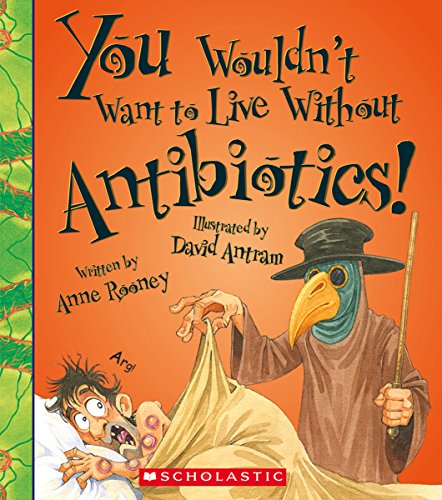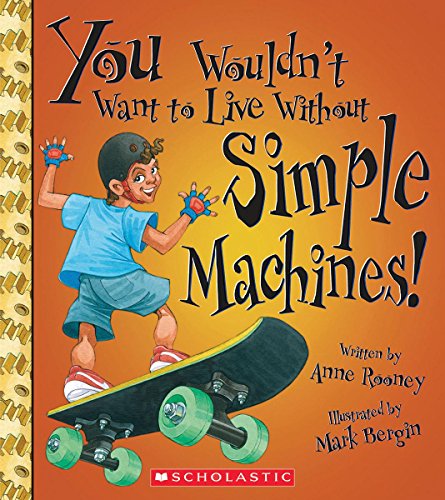-
You Wouldn't Want to Live Without Extreme Weather!
Roger Canavan, Mark Bergin
Library Binding (Franklin Watts, Feb. 1, 2015)What if there were no hurricanes or tornoadoes?It's a nuisance when it rains on a picnic. It's a tragedy when a tornado destroys a neighborhood. But our planet would be a very different place if it did not have extremes of weather. Some plants can grow only in hot, dry conditions; others require cold temperatures at certain times of year. And if the Arctic and Antarctic were less cold, melting ice would raise sea levels around the world and cause widespread flooding. This entertaining book in the You Wouldn't Want to Live Without series looks at how weather has shaped the world we live in. R
R
-
You Wouldn't Want to Live Without Bacteria!
Roger Canavan, Mark Bergin
Library Binding (Franklin Watts, Feb. 1, 2015)They are far too small to be seen with the naked eye, but bacteria are one of the most widespread forms of life-and one of the oldest.This series takes readers (Ages 8-12) on a historical journey, examining how people coped in the past and how they developed ingenious ways to make life safer and less unpleasant. Each book features full-color cartoon-style illustrations and hilarious speech bubbles to heighten interest, making the series attractive even to reluctant readers. They appeared on Earth more than 3 billion years before the first dinosaurs. Some bacteria cause deadly diseases, but many are harmless or even helpful to humans and other animals. They fertilize the soil by breaking down dead material into useful chemicals, and they are an essential ingredient in many foods. Bacteria in our own bodies are a vital part of the digestive process. T
T
-
You Wouldn't Want to Live Without Antibiotics
Anne Rooney
Library Binding (Franklin Watts, Sept. 1, 2014)If antibiotics had not been discovered, would you be alive today? Nowadays we can treat all sorts of nasty injuries and illnesses, but it certainly wasnt so straightforward hundreds of years ago. In this title from the fantastic new You Wouldnt Want to Live Without series, youll learn all about the bizarre and gruesome ways that people used to combat infection: from maggots, to leeches, to moss! As you discover how bacteria work in your body, learn handy hints on how to survive throughout the ages, and discover how medicine is used in the present day, youll soon see why you really, really, wouldnt want to live without antibiotics! The well-organized text in this title allows readers to explore relationships between historic scientific events. Grade-appropriate contexts help readers determine the meaning of academic words and phrases while the vivid illustrations and text features help navigate the text and locate answers to questions.
-
You Wouldn't Want to Live Without Poo!
Professor Alex Woolf
Paperback (Salariya Book Company Ltd, Jan. 7, 2016)Learn the surprising truth about just how important poo really is: it keeps our bodies healthy, and can also be used to power our cars, heat our homes and help grow our crops. You Wouldn't Want to Live Without Poo! is part of a brand-new science and technology strand within the internationally acclaimed You Wouldn't Want to Be series. T
T
-
You Wouldn't Want to Live Without Satellites!
Ian Graham, Mark Bergin
Library Binding (Franklin Watts, Sept. 1, 2018)This series takes readers (Ages 8-12) on a historical journey, examining how people coped in the past and how they developed ingenious ways to make life safer and less unpleasant.Each book features full-color cartoon-style illustrations and hilarious speech bubbles to heighten interest, making the series attractive even to reluctant readers.A satellite is a small object traveling around something bigger. The Moon is a natural satellite of Earth. A spacecraft launched into orbit around Earth is an artificial satellite. Since Sputnik-1, about 6,000 more satellites have been launched by 40 countries. Nearly 4,000 are still in orbit, and about 1,000 of them are still working. Learn about how we use satellites every day without knowing it to talk on the telephone, watch television, use the internet, predict the weather, navigate the landscape, and run businesses. W
W
-
You Wouldn't Want to Live Without Boogers!
Alex Woolf, David Antram
Library Binding (Franklin Watts, Sept. 1, 2016)What if we didn't have mucus? The insides of our bodies would be very dry, and we would find it hard to digest our food.This series takes readers (Ages 8-12) on a historical journey, examining how people coped in the past and how they developed ingenious ways to make life safer and less unpleasant. Each book features full-color cartoon-style illustrations and hilarious speech bubbles to heighten interest, making the series attractive even to reluctant readers.We would also quickly become sick, because mucus protects us from dirt in the air that we breathe. But what exactly is this sticky, slimy stuff we call mucus? What's it made of? Is it the same thing as snot? Why do we produce more of it when we have a cold? And what do animals like slugs and snails do with their mucus? You might find it a bit gross, but you wouldn't want to live without snot! R
R
-
You Wouldn't Want to Live Without Glass!
Ian Graham, Mark Bergin
Library Binding (Franklin Watts, Sept. 1, 2016)Can you imagine what your world and your life would be like if there was no glass?This series takes readers (Ages 8-12) on a historical journey, examining how people coped in the past and how they developed ingenious ways to make life safer and less unpleasant. Each book features full-color cartoon-style illustrations and hilarious speech bubbles to heighten interest, making the series attractive even to reluctant readers.You use glass from morning to night every day, from the mirror you look in when you wash your face in the morning to the bulbs that light up your home after dark. All sorts of foods and drinks are stored in glass bottles and jars. Many of your electronic gadgets have glass screens. Cameras and spectacles, or eyeglasses, have glass lenses. The signals that carry your phone calls and texts, and Web pages when you're online, make part of their journey along glass communications cables. And every home, school and workplace has glass windows. You wouldn't want to live without glass. S
S
-
You Wouldn't Want to Live Without Numbers!
Anne Rooney
Paperback (Salariya Book Company Ltd, Aug. 18, 2016)You might not like numbers when you have to do your maths homework, but it would be hard to live without them. Imagine how difficult life would be if you couldn't count things or be precise about time, distance or price. You wouldn't know how old you are, or how long you have to wait until it's the holiday. We couldn't build anything accurately, we'd have no computers and you couldn't even go shopping. You Wouldn't Want to Live Without Numbers! is part of a brand-new science and technology strand within the internationally acclaimed You Wouldn't Want to Be series. The clear, engaging text and humorous illustrations bring the subject to life and stimulate young readers' curiosity about the world around them. T
T
-
You Wouldn't Want to Live Without Books!
Alex Woolf, David Salariya, David Antram
Library Binding (Franklin Watts, Sept. 1, 2014)Can you imagine a world without books? What if writing simply didnt exist? It might sound unbelievable, but books have actually been around for thousands of yearsa lot longer than weve had paper and ink! This title in the fantastic new You Wouldnt Want to Live Without series traces the history of books from their earliest origins as clay tablets to their very latest formthe e-book. Youll learn how important theyve been to our culture and civilization, and soon see why you really, really, wouldnt want to live without them. Featuring a handy timeline, fascinating facts and top tips on how to make books through the ages. The well-organized text in this title allows readers to explore relationships between historic scientific events. Grade-appropriate contexts help readers determine the meaning of academic words and phrases while the vivid illustrations and text features help navigate the text and locate answers to questions. R
R
-
You Wouldn't Want To Live Without Pain!
Fiona MacDonald, David Antram
Library Binding (Turtleback Books, Feb. 1, 2016)FOR USE IN SCHOOLS AND LIBRARIES ONLY. A pain-free world may sound wonderful, but if pain did not exist, our lives would be very dangerous. Learn about the science behind how our bodies are able to experience pain, the ways pain helps us to stay safe, and the harsh reality of life before modem painkillers. Experts from Experts: Studies show that men and women experience pain differently. On average, women cope better with extreme pain than men do. Soldiers and athletes sometimes don't realize that they've been injured because endorphins in their bloodstream make them feel invincible. There are 90,000 miles of nerve fibers in a typical human body. Learn some simple first-aid skills that can help soothe pain and save lives R
R
-
You Wouldn't Want To Live Without Libraries!
Fiona Macdonald
Paperback (Book House, April 28, 2019)For 5,000 years and more, libraries have been gathering and preserving writings of all kinds. They re keepers of the world's memory. They re storehouses of knowledge, and imagination, and fun. Learn about how these places and their collections of written words allow us to check our facts, find important information, share stories, beliefs and ideas, build communities and learn valuable life skills. Specially commissioned cartoon-style illustrations in full colour make these books attractive and accessible even to reluctant readers. Information is conveyed through captions, labels and humorous speech bubbles in addition to the main text. Illustrated sidebars headed 'How It Works', 'Top Tip' or 'You Can Do It' supply more facts, describe simple, safe experiments, or steps that readers can take to help make the world a better place. Each volume includes a timeline and a list of 'Did You Know?' facts. Sample fact: Perhaps 80% of ancient writings have been lost. The 20% that have survived were preserved in libraries such as Alexandria, where scribes made copies of important texts.
-
You Wouldn't Want to Live Without Simple Machines!
Anne Rooney, Mark Bergin
Library Binding (Franklin Watts, Sept. 1, 2018)Learn about how simple machines enable practically everything around us to work.This series takes readers (Ages 8-12) on a historical journey, examining how people coped in the past and how they developed ingenious ways to make life safer and less unpleasant. Each book features full-color cartoon-style illustrations and hilarious speech bubbles to heighten interest, making the series attractive even to reluctant readers.Simple machines are around us all the time and we use them every day. You might not even think of them as machines. Many are built into complex (compound) machines-but the simple machine is still in there, doing its job. Learn about how simple machines enable practically everything around us to work, allowing us to travel in wheeled vehicles, lift very heavy objects, fix things together, and break things apart. T
T